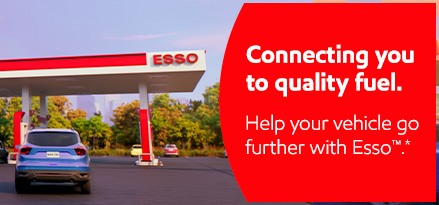
Why choose Synergy™ fuels?
It’s the attention to detail that goes into Esso™ Synergy gasoline that sets us apart. All Esso fuels are carefully formulated and backed by Imperial, whose products have kept Canadians moving for more than 140 years.
That legacy continues today as Esso leads the way with the meticulous engineering of our Synergy gasoline and diesel fuel products. Through innovation, painstaking design, and tireless testing, our Synergy unleaded gasoline is proven to take you further by helping to improve fuel economy, engine responsiveness, and performance.*
Included in our Synergy fuel offerings is our premium grade fuel, Esso Supreme™ and Esso Supreme+™ (where available).

Benefits of our gasoline*
-

Improved fuel economy
• Designed to protect from engine deposits to help your vehicle go further.*
-

Engine protection
• Helps protect intake valves and prevent rust in your vehicle’s fuel system.
• Esso Synergy gasoline is rated among the top ranked quality gasolines in Canada.* -

Better responsiveness
• Improves your car’s performance by preventing buildup in your engine.
• We help you optimize efficiency and keep a clean engine through the use of high-quality gas additives.*

Adherence to government standards for the best gasoline in Canada

Our Best Gas for Your Vehicle Synergy™ gasoline - Quality you can depend on
When you fill up at an Esso™ or Mobil™ station, you can be confident you’re getting our best gasoline every time. Synergy gasoline has been engineered to help improve fuel economy and performance.*
Fuel detergents – provide outstanding cleanliness in port fuel injection engines, and in gasoline direct injection engines. Cleaner engine parts can lead to better gas mileage, engine protection and engine performance. Our most advanced detergent keeps your engine 3X cleaner for better gas mileage.
(Benefit available only in Esso Supreme line up of premium gasoline)**
Friction modifier – new ingredient protects your engine by reducing wear and tear.
(Benefit available only in Esso Supreme line up of premium gasoline)
Anti-adhesion compound – helps prevent fuel detergents from forming a sticky film on the intake valves, which in turn helps prevent cold start problems at cold temperatures
Corrosion inhibitor – helps prevent rust in fuel distribution systems and/or key engine parts the fuel comes into contact with, such as the gas tank and the intake valves
Demulsifier – helps keep water from getting disbursed with our additive in the distribution system and helps prevent accumulation of water in your gas tank by allowing it to be separated and removed
Solvent fluid – enables the additive ingredients to stay mixed, flow and not freeze at very cold temperatures
Marker molecules – ensures we can determine if the correct amount of our unique additive is added to our gasoline
*Benefits are based on Synergy-branded gasoline compared to gasoline meeting minimum Canadian government standards. Actual benefits will vary based on factors such as vehicle type, driving style and gasoline previously used. Concentration and availability of our proprietary additive package may vary.
**Esso Supreme premium gas to gasoline meeting minimum Canadian government detergency standards in port fuel injected engines. Actual benefits are based on continuous use and may vary depending on vehicle type, driving style, and gasoline previously used. Concentration and availability of our proprietary additive package may vary.

Synergy gasoline grades of fuel
Esso stations across Canada offer differing grades of Synergy gasoline to meet the performance needs of every vehicle. The octane rating is a measure of the fuel's ability to resist knocking.
To determine which Synergy gasoline grade is best for your vehicle, check your owner’s manual.
Synergy™ Regular
Octane 87
Great quality gasoline you can trust to keep your engine clean with more detergent than required for minimum government standards.
Synergy™ Extra
Octane 89
Higher octane and detergents for improved cleanliness and performance gives you the "Extra" reassurance you need.
Have a question about our fuels?
When you purchase gasoline at an Esso- and Mobil-branded gas station, you’re fueling with advanced Synergy gas. Engineered with seven key ingredients to help improve fuel economy,** Synergy gasolines provide lower emissions and improved engine responsiveness** and are designed to provide corrosion protection and improved performance compared with gasolines meeting minimum government detergency standards. In addition, Synergy™ gasoline contains significantly higher detergent levels than CGSB requirements and has passed a series of deposit control performance tests.
Yes! Detergents are added to gasoline to help clean vital engine parts, including fuel injectors and intake valves. While the Canadian government has mandated that all gasoline marketed in Canada contains detergents, our gasoline contains more than the minimum quantities required.*
If you filled your tank prior to the 1990's, you might remember that there were two choices of gasoline: "regular" and "unleaded." At the time, "regular" gasoline contained tetraethyl lead, which served as an octane booster in fuel. All vehicles manufactured after 1975 are built with catalytic converters and require unleaded gasoline. Catalytic converters help convert pollutants in exhaust to less toxic gasses such as carbon dioxide, nitrogen, and water vapor. Due to environmental concerns, leaded gasoline was phased out in the 1990’s and can no longer be sold at any gas station in Canada. Today, "regular gas" no longer refers to gasoline with lead content, but rather to a certain grade of unleaded gasoline.
The performance of gasoline is determined by multiple factors, including its antiknock quality (also known as octane rating), its volatility, and its detergency. Check your owner’s manual to see what octane rating is right for your vehicle.
Antiknock, also known as octane rating, is a measure of the gasoline's ability to resist knocking or pinging during combustion. Since it is gasoline vapor rather than liquid fuel that ignites, the air-to-fuel mixture must be correct for smooth combustion. The higher the octane rating, the greater the engine's resistance to knock. Some of the problems associated with knock are overheating of critical engine parts – namely valves, pistons and spark plugs. To minimize the effects of knocking, modern engines are equipped with knock sensors, which temporarily delay the spark timing in the piston’s compression cycle. While this prevents audible knocking, delaying the ignition spark also sacrifices engine efficiency.
Detergency is the performance characteristic of a gasoline that refers to its ability to clean and protect the fuel delivery system, including the carburetor or fuel injectors, and intake valves. A gasoline detergent is fundamentally like a household detergent. It is a molecule that affixes itself to dirt particles. As gasoline passes through a car's engine, the molecule helps clean away dirt particles and helps to prevent any harmful deposit build-up.
Ethanol is a non-fossil fuel that is produced from a variety of agricultural crops such as sugarcane, corn and wheat. As of December 15, 2010, Canada’s Renewable Fuels Regulations require an average renewable fuel content of 5% in gasoline.*
